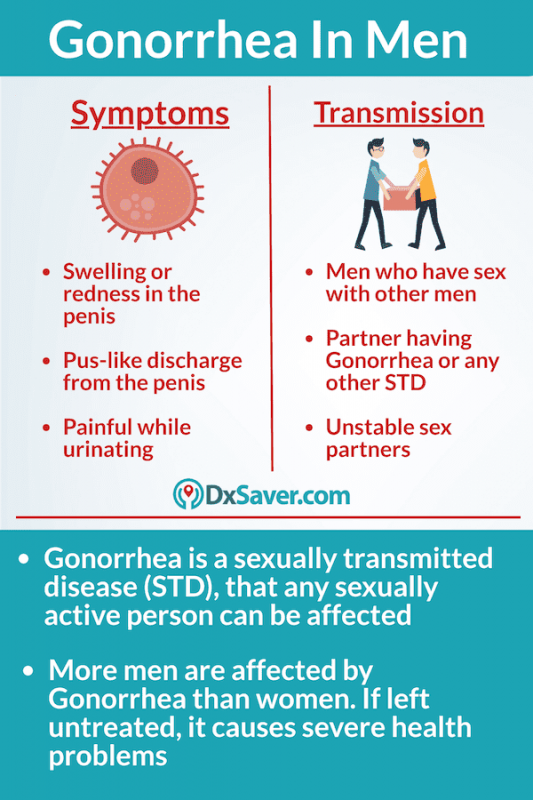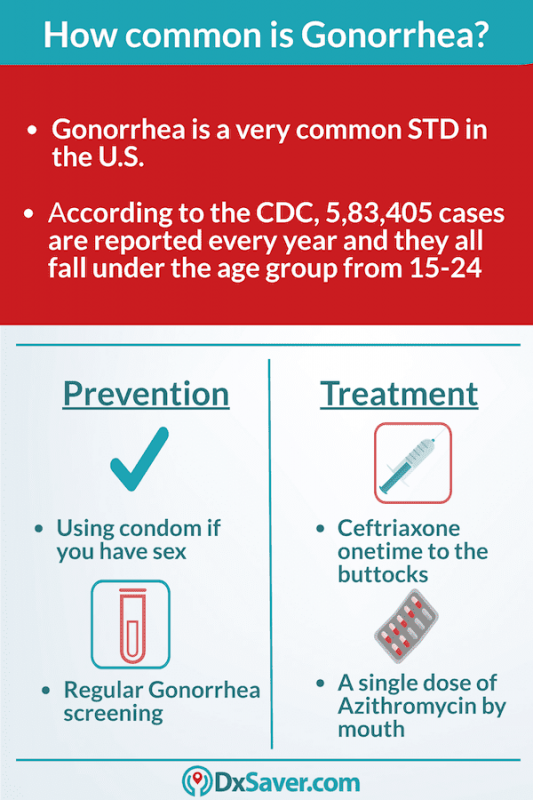
Gonorrhea is the most common infection caused by a sexually transmitted disease from bacteria called Neisseria Gonorrhoeae that infects both men and women. Gonorrhea can cause many serious problems to your body when left untreated. Most people affected by Gonorrhea do not show any symptoms. But it can be cured with the right medication if treated at an early stage. It is also said that men are more often affected by Gonorrhea infection than women. So we recommend every sexually active person to get tested for Gonorrhea at least once in a year.
The article below covers all the relevant topics of Gonorrhea disease like Gonorrhea symptoms in men, causes, complications, gonorrhea prevention, and how to get tested for Gonorrhea sitting at home or by visiting labs.
- Is Gonorrhea an STD?
- Why Gonorrhea is called the clap?
- What are the symptoms of Gonorrhea in men?
- What are the causes of Gonorrhea in men?
- Can Gonorrhea be cured?
- What is the treatment for Gonorrhea?
- What happens if Gonorrhea is left untreated?
- How to prevent Gonorrhea?
- How to get tested for Gonorrhea?
- Providers location
Is Gonorrhea an STD?
Gonorrhea is a very common Sexually transmitted disease in the U.S, approximately 1.14 million new Gonococcal infections occur in the United States every year and as many as half of it occur among the young people aged 15-24. As per the reports from the Centers for Disease Control and Prevention (CDC), in 2018, 583,405 cases of gonorrhea were reported. That is why it’s very important to get tested for STD because the sooner you know, the faster you get rid of it. In the U.S, the highest reported cases of infection are sexually active teenagers, young adults, and African Americans. People who have had gonorrhea and have undergone treatment can be again infected if they have sexual contact with a person infected with gonorrhea.
Why Gonorrhea is called the clap?
Gonorrhea is otherwise called “The clap”. In the year 1500s, “clappier” was an old French word meaning brothel. The use of the word clap then would have referred to the location where the disease mostly spread, a brothel. In French, the disease was known as “clapier bubo” meaning an infection of the penis resulting from a visit to a brothel.
There are also a few theories that have been stated in modern times. During the early 1900’s, GIs were often infected with Gonorrhea during the World Wars. It was also said that they had “the collapse,” which was shortened and transformed into the word clap. It is also sometimes called the drip.
What are the symptoms of Gonorrhea in men?
Some men with gonorrhea may not show any symptoms. Symptoms in men usually are not visible within 2 to 14 days after exposure. However, some men infected with gonorrhea never develop noticeable symptoms. It’s very important to remember that a person with gonorrhea, who doesn’t show any symptoms, is also called an asymptomatic carrier, which is still contagious. A person is more likely to spread the infection to other partners during sex when they don’t have noticeable symptoms. The first noticeable symptom in men is a burning or painful sensation during urination. As it progresses, other symptoms may start occurring:
- Greater frequency or urgency to pee
- Pus-like discharge from the tip of the penis (white, yellow, beige, or greenish)
- Swelling or redness at the tip of the penis
- Swelling or pain in the testicles (although this is less common)
- A persistent sore throat
The infection will still stay in the body for a few weeks after the symptoms have been treated. Gonorrhea infection can also infect your eyes, throat, or joints.
What are the causes of Gonorrhea in men?
Gonorrhea is caused by a bacterium called Neisseria gonorrhoeae. These bacteria are most often passed from one person to another during sexual contact, including oral or anal intercourse. Gonorrhea is spread when semen, pre-cum gets inside your genitals, anus, or mouth. It can also be caused when you touch your eyes if you have infected fluids in your hand. Mainly, men who have sex with men are at increased risk of getting gonorrhea. In rare instances, gonorrhea can also continue to cause damage to your body, specifically the urethra and testicles. Pain may also spread to the rectum of your body.
Gonorrhea can’t be caused by any casual contact. That is you can’t get it from sharing food or drinks, kissing, hugging, holding hands, coughing, sneezing, or sitting on a toilet seat.
Other factors that can cause Gonorrhea are:
- Unstable sex partners
- A sex partner who has other partners
- Having more than one sex partner
- You or your partner having gonorrhea or another sexually transmitted infection
Can Gonorrhea be cured?
Yes, gonorrhea can be cured if the right treatment is given. It is important that you take all of the medication your physician prescribes to cure your infection. But medication for gonorrhea should not be shared with anyone. Although medication will stop the spread of infection, it will not undo any permanent damage caused by gonorrhea.
It is becoming harder to treat some gonorrhea nowadays, as drug-resistant strains of gonorrhea are increasing. If your symptoms continue to show for more than a few days after receiving treatment, you should return to a health care provider to get checked again.

What is the treatment for Gonorrhea?
Modern antibiotics can cure gonorrhea infections. Most of the states also provide free diagnosis and treatment It is usually treated with an antibiotic injection either Ceftriaxone one time to the buttocks or a single dose of Azithromycin by mouth. Once on antibiotics, you should feel relief within few days. Your doctor will give you antibiotics to kill the bacteria caused by gonorrhea. Some strains are becoming immune to certain antibiotics, so you’ll get two types of drugs, that is an injection and pills. Be sure to take all your medication, even if you feel better quickly.
If you’re pregnant and you have gonorrhea, talk to your doctor so that you can get the right treatment. This STD can cause health problems for your baby, so it’s important to treat the disease as soon as possible to help lower your baby’s risk for complications.
With the right amount of treatment, gonorrhea is curable. But one successful treatment won’t protect you forever. You’ll need to keep practicing safe sex for not get it again.
What happens if Gonorrhea is left untreated?
Untreated gonorrhea can cause serious and permanent health problems in men.
- Infertility in men. Gonorrhea can cause a small, coiled tube in the rear portion of the testicles where the sperm ducts are located to become inflamed. Untreated epididymitis can lead to serious problems like infertility.
- Infection that spreads to the joints and other areas of your body. The bacteria that cause gonorrhea can spread through the bloodstream and infect other parts of the body, including your joints. Fever, rash, skin sores, joint pain, swelling, and stiffness are the results.
- Increased risk of HIV/AIDS. Having gonorrhea makes you more susceptible to infection with HIV, the virus that leads to AIDS. Individuals who have both gonorrhea and HIV are able to pass both diseases more readily to their partners.
How to prevent Gonorrhea?
To reduce the risk of gonorrhea:
- Do not have sex partners. Being in a monogamous relationship that is practicing sex with only your husband/wife can lower your risk of getting infected by Gonorrhea.
- Consider regular gonorrhea screening. Regular screening is recommended for sexually active men younger than 25 and for older men at increased risk of infection. This includes men who have a new sex partner, more than one sex partner, a sex partner with other partners, or a sex partner who has an STD or STI.
Regular screening is also recommended who have sex with men, as well as their partners.
To avoid getting gonorrhea again, avoid sexual activities until after you and your sex partner have completed treatment and after symptoms are gone.

How to get tested for Gonorrhea?
Healthcare professionals can diagnose gonorrhea infection in various ways. They will take a sample of fluid from the symptomatic area with a swab (penis, rectum, or throat) and place it on a glass slide. If incase your Physician suspects a joint or blood infection, they will obtain the sample by drawing blood or inserting a needle into the symptomatic joint to withdraw fluids. They will then add a stain to the sample and then examine it under a microscope.
A second method involves taking the same sample and placing it on a special dish. This will be incubated under an ideal growth condition for several days. A colony of gonorrhea bacterium will grow if gonorrhea is present in the sample.
The following table shows the Gonorrhea home test kit and Gonorrhea test cost at 3 of our partner laboratories (CLIA – Certified) network located across the U.S.
Name of our Partner Labs | Book Online |
STD Check Labs
| Starting from
$49 |
LetsGetChecked(Home Test Kit)
| Starting from
$74.25 |
HealthLabs
| Starting from$59 |
Is there any preparation required before the test?
You should not urinate for at least one hour before the test. No other special preparation is required to test for Gonorrhea infection.
Provider Locations
A gonorrhea test can be done in any of the following states either at the provider’s location or at home. To know the Gonorrhea test cost in these locations, refer to the first section of this article.
- Alabama
- Arizona
- Arkansas
- California
- Colorado
- Connecticut
- Delaware
- Florida
- Hawaii
- Georgia
- Idaho
- Illinois
- Indiana
- Iowa
- Kansas
- Kentucky
- Louisiana
- Maine
- Michigan
- Minnesota
- Mississippi
- Missouri
- Montana
- Nebraska
- Nevada
- New Hampshire
- New Mexico
- North Carolina
- North Dakota
- Oklahoma
- Oregon
- Pennsylvania
- Puerto Rico
- South Carolina
- South Dakota
- Tennessee
- Texas
- Utah
- Vermont
- Virginia
- Washington
- West Virginia
- Wisconsin
- Wyoming
Frequently Asked Questions
Will insurance cover my testing cost?
No, insurance will not be covered in the billing. However, they will provide you a receipt for insurance reimbursement purposes.
How should I book my appointment?
You can choose the most suitable provider from above and make an appointment by following the instructions mentioned by them.
Can I cancel my lab test order?
Yes, you can cancel your lab test order anytime before your testing. A refund will be initiated after deducting the cancellation fee. However, cancellation is at the discretion of the provider.
Do the providers offer result interpretations?
Yes, a few providers may provide doctor consultation who will take you through the results and provide clarification if needed.
How do I receive my report?
To ensure your privacy, the test report will be mailed to you by the provider.
Other topics you may be interested in:-
- Is Itching a Symptom of STD?
- Signs and Symptoms of Oral Syphilis
- Why Do I Have Vaginal Burning Sensation?
- Importance of hCG Qualitative Pregnancy Test
- Symptoms of Herpes Infection in Men
- At-home STD Kit providers in the U.S. – Get tested for STD sitting from home
- At-home HIV Test Kit providers in the U.S.
- Lipid panel test cost in the U.S.
- Vitamin B12 Test Cost in the U.S.
- How much does the Quantiferon Gold TB Test Cost in the U.S?
- Cost of Progesterone (Infertility) Test Cost in the U.S.
- Can you get an STD from a toilet seat?
- Causes of Bruising on Skin & Other STD Symptoms
- Hepatitis B Test Cost in the U.S.
- Is Bacterial Vaginosis an STD?
- Types of STDs that cannot be cured
- Herpes Vs. HPV: Differences, Symptoms, and Testing Cost
- Oral STDs: Names, Symptoms, Treatment and Testing Cost
- Estradiol (E2) Hormone: Normal Levels, Importance in Women Fertility and Testing Cost





